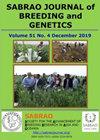哈萨克斯坦东南部不同耕作制度对土壤水分理化性质的影响
IF 1.7
Q3 PLANT SCIENCES
引用次数: 0
摘要
为了改善和合理利用旱地,研究了不同耕作方式对哈萨克斯坦东南部旱地土壤-水物理关系和土壤农化性质的影响。耕层(0 ~ 30 cm)土壤密度在作物播种至收获的整个生命周期中,采用传统耕作方式增强至中等压实状态(1.28 ~ 1.29 g/cm3),少耕时略高(1.30 ~ 1.31 g/cm3),免耕时最高(1.32 ~ 1.33 g/cm3)。在传统耕作制度和最少耕作制度下,耕作土壤层中较好的破碎、溶解和较好的植物残留物摄取有助于土壤密度的轻微降低。在夏季降雨最少的情况下,常规耕作土壤的生产水分储量(15.9 ~ 34.5 mm)有所下降。而土壤水分则随着少耕(20.7 ~ 36.7 mm)和免耕(29.8 ~ 54.8 mm)的减少而逐渐增加。土壤中硝态氮含量也从初始状态下降到栽培作物收获期,且在免耕时出现明显下降。无雨期延长,空气相对湿度下降,土壤湿度下降,温度升高,影响了植物的生理过程,最终影响了所研究作物的产量。在所研究的作物中,平均而言,以最少的耕作获得1.76吨/公顷的最高产量。双向方差分析(ANOVA)结果表明,作物在粮食产量构成中的贡献份额随作物季节而变化,在0.73% ~ 2.89%之间,土壤栽培方式的贡献份额为83.3% ~ 93.8%。粮食产量的形成更大程度上依赖于耕作制度,尽管这种依赖可能随着作物生长期间的天气条件而变化。在哈萨克斯坦东南部的雨养条件下,与常规耕作和最少耕作相比,免耕作导致硝酸盐氮的显著减少。因此,在不耕作的情况下,无论耕作方式如何,都需要比通常耕作和施用钾肥更多的氮肥。本文章由计算机程序翻译,如有差异,请以英文原文为准。
DIFFERENT TILLAGE REGIMES' EFFECT ON SOIL-WATER PHYSICAL AND AGROCHEMICAL PROPERTIES UNDER THE ENVIRONMENTAL CONDITIONS OF SOUTH EAST KAZAKHSTAN
For improvement and rational use of rainfed lands, a study on the influence of different tillage methods proceeded on the soil-water physical relationship and soil agrochemical properties in Southeast Kazakhstan. In the arable soil layer (0–30 cm), the soil density during the studied crop’s life from sowing to harvesting, enhanced to a medium compacted state with the traditional method of tillage (1.28–1.29 g/cm3), slightly higher with the minimum tillage (1.30–1.31 g/cm3), and the highest with zero tillage (1.32–1.33 g/cm3). Tillage with better crumbling, dissolution, and superior ingestion of plant vestiges in the cultivated soil layer contributed to a slight decrease in soil density, both with traditional and minimum tillage regimes. Given the least rainfall in summer, there was a decline in the productive moisture reserves in the soil with customary tillage (15.9–34.5 mm). However, the soil moisture enhanced gradually with reduced tillage, i.e., minimal tillage (20.7–36.7 mm) and zero tillage (29.8–54.8 mm). The nitrate nitrogen content in the soil also decreased from the initial state to the cultivated crops’ harvest, and a significant decrease emerged with zero tillage. The prolonged rainless period, accompanied by a decline in relative air humidity, soil moisture, and temperature increases, affected plants’ physiological processes and, eventually, the studied crops’ yield. In the studied crops, on average, acquiring the highest yield of 1.76 t/ha was with minimal tillage. Based on two-way analysis of variance (ANOVA), the contributed share of the crops in the grain yield formation was according to crop season, ranging from 0.73% to 2.89%, and the soil cultivation methods’ share was 83.3%–93.8%. The grain yield formation has a greater dependence on the tillage regimes, although that reliance might vary in association with weather conditions during the crop life. In rainfed conditions of Southeast Kazakhstan, zero tillage results in a significant reduction in nitrate nitrogen compared with conventional and minimum tillage. Therefore, with no tillage, more nitrogen fertilizer is necessary than usual plowing and the application of potash fertilizers, regardless of tillage methods.
求助全文
通过发布文献求助,成功后即可免费获取论文全文。
去求助
来源期刊

Sabrao Journal of Breeding and Genetics
农林科学-奶制品与动物科学
CiteScore
1.90
自引率
50.00%
发文量
63
期刊介绍:
The SABRAO Journal of Breeding and Genetics is an international journal of plant breeding and genetics research and was first published in 1969. It is the official publication of the Society for the Advancement of Breeding Research in Asia and Oceania (SABRAO).
Its objectives are to: promote the international exchange of research information on plant breeding and genetics, by describing new research findings, or ideas of a basic or practical nature; and be a medium for the exchange of ideas and news regarding members of the Society.
The Journal gives priority to articles that are of direct relevance to plant breeders and with emphasis on the Asian region. Invited for publication are research articles, short communications, methods, reviews, commentaries, and opinion articles. Scientific contributions are refereed and edited to international standards.
The journal publishes articles for SABRAO members mainly. The Journal preferred strongly that at least one author should be a current member of the Society. Non-members may also publish in the journal.
 求助内容:
求助内容: 应助结果提醒方式:
应助结果提醒方式:


